Women Dalit Writers of Modern India
- May 31, 2024

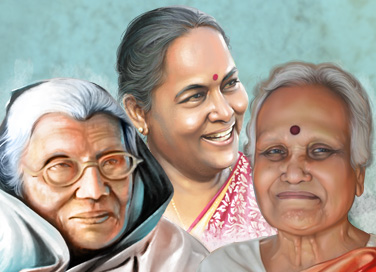
Women Dalit Writers of Modern India
- May 31, 2024
By Jayshree Misra Tripathi
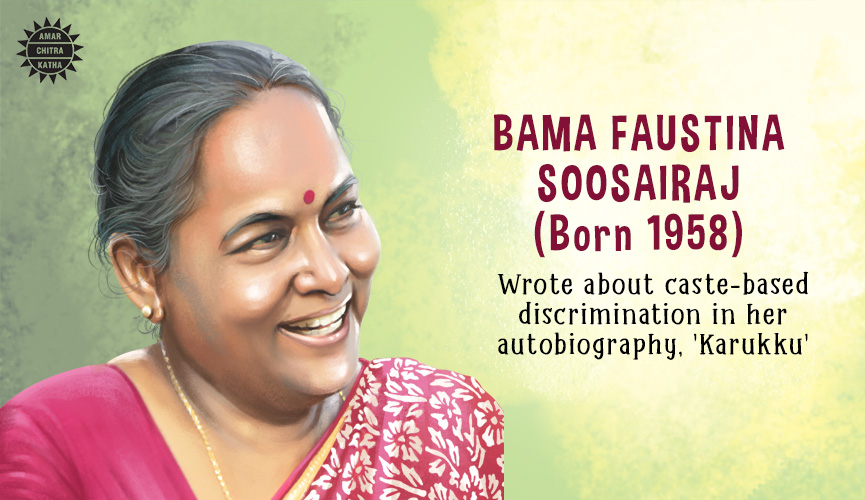
Bama Faustina Soosairaj was born on 14 March 1958, in the village of W. Puthupathy in Tamil Nadu. Her father was in the Indian Army and her mother worked as a coolie. It was her mother, Bama says, who brought her up as a sensitive human being. Bama’s childhood had a definitive impact on her thoughts. As a child, she would accompany her grandmother during school holidays to their landlord’s fields. It was here that she first witnessed the humiliation their caste faced, that she was later to write about in her autobiography, Karukku (1992). From a distance, she would watch her grandmother being given stale food by the landlord’s wife, in the very cowshed they cleaned. She would hear the many taunts and abuses that were hurled at them by others in the fields. The contempt they were held in made her very unhappy. Bama was a good student and after 8th grade, she was sent to a nearby town for higher studies.
Bama’s grandfather had converted to Christianity. She also decided to take the holy orders to escape caste-based discrimination. Then began her journey to educate children and women about their self-respect and self-esteem. As a primary school teacher, she underscored the importance of social equality in her students. She also lectured in colleges, acting upon Dr Ambedkar’s advice, which had motivated her to stand tall: “to educate, agitate and organize.”
To receive more such stories in your Inbox & WhatsApp, Please share your Email and Mobile number.
Bama feels that writing is a weapon to fight caste discrimination and that writing itself is a political act. She says she writes because she feels it is her duty and responsibility towards the people of her caste. Bama continues to teach and does her own housework too. During school holidays, she gives talks and attends literary meets.
Her first novel Karukku, depicts the joys and sorrows experienced by Dalit Christian women in Tamil Nadu. It has been translated into other Indian languages, English, and French. Bama has also written over 20 short stories. Her brother, Raj Gauthaman, is a renowned Dalit writer.
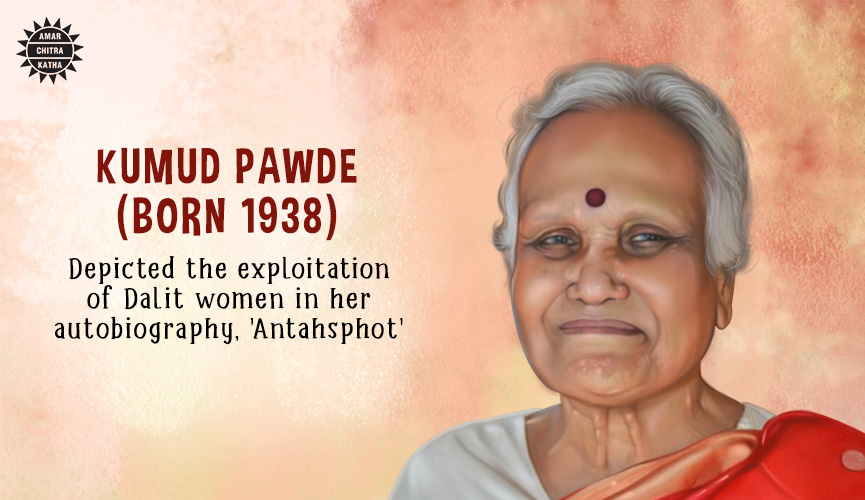
Born in 1938, into a Mahar Dalit family of Nagpur, Maharashtra, Kumud Somkuwar’s childhood was fraught with pain. Not only did they live in colonies according to caste, her classmates and teachers used to beat her at school. She has said that she never cried. Instead, she kept going back to class and went to school regularly. The other children would humiliate her when she would go to drink water. Kumud never gave up and studied diligently. Education was important in their family and both her parents were well-educated. They lived on a meagre income that her father, a pleader’s clerk, would receive when the lawyer had cases.
Kumud’s excellent command of Sanskrit was noticed at school. She went on to study Sanskrit at college, amongst the first Dalits to do so. At the age of 18, she became a Buddhist. Her parents belonged to Babasaheb Ambedkar’s Buddhist movement. She was recommended as a fellow teacher to Motiram Pawde, who was teaching underprivileged children at night-schools. They fell in love and married, despite the opposition from both families, since he belonged to an upper caste. Motiram was a freedom fighter and followed Dr Ambedkar’s ideals.
Kumud drew her strength from Dr Ambedkar’s message to strive for liberty or freedom – intellectual freedom and social freedom. Though she had topped her MA, she remained unemployed for many years, due to caste discrimination. It was only after her marriage that she received a job offer. In a short story, ‘The Story of my Sanskrit’, Kumud wrote, “It was Kumud Pawde who was given the job, not Kumud Somkunwar”. Her husband supported her in every way.
Kumud was declared a Sanskrit Pandita by the Nagpur Vidyalaya and retired as the Head of Department of Sanskrit at the Government College, Amravati, Maharashtra. She became a member of the All- India Progressive Women’s movement and a founder-member of the National Federation for Dalit Women. As an activist, she campaigned vigorously for inter-caste marriages and helped facilitate 300 marriages, it is said. Her autobiography, Antahsphot, also translated into English by Maya Pandit, depicts the exploitation of Dalit women and how they suffered indignities, poverty and violence.
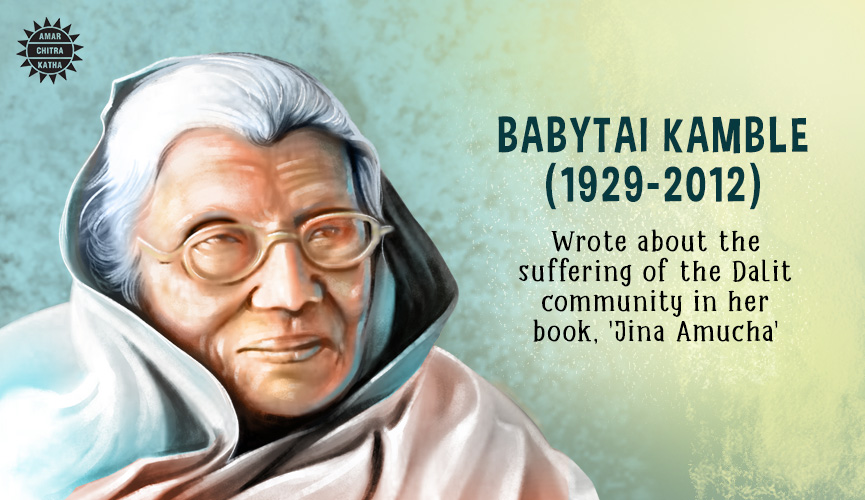
The day Baby was born into a Mahar family, in Veergaon, a village in Pune, it was thought that she was dead. Her mother begged her relatives to allow her to hold her baby till dawn, as all her other daughters had been buried at night. Baby’s eyelids fluttered in the early hours and she was alive. Thereby began an inspirational story of courage. Inspired by Dr Ambedkar’s teachings, she also admired her grandmother, Sitavahini, who had fearlessly led a revolt against the Dalit community eating dead cattle meat. Her family had converted to Buddhism.
Her father was a labour contractor and her maternal grandfather and grand-uncles had been butlers for the British. At the age of 13, Baby was married to Kondiba Kamble. They soon opened a provision store. She gave birth to ten children, three of whom died in their childhood. This was because Dalits were denied basic medical facilities. Baby had studied only up to Grade 4 but she began to learn a lot from the newspapers she used to wrap provisions in for their customers.
In her spare time, she began to write her thoughts in a notebook. She also joined a library. Baby’s book, Jina Amucha (translated into English as The Prisons We Broke, 2008, by Maya Pandit), narrates not just her experiences, but the suffering of her community too. Her writing has been called ‘reflexive’ and sets her apart from other Dalit feminist writers. She once remarked in an interview: “There is a saying that a black cow can survive even on thorns. Our women were like that proverbial black cow.” Kamble was fondly called Baby tai (elder sister) with affection. She wrote deftly on what she termed ‘triple subjugation’ – gender, caste and patriarchy. Yet she hid her writing from her family for over twenty years. She also wrote poems. Feminist scholar, Maxine Bernsten, who was doing research in Phaltan, Maharashtra, encouraged her to publish her writing. Babytai wrote on patriarchy and internalized patriarchy by Dalit women.
Babytai participated in the Mahila Mandal formed by Raja Malojiraje Nimbalkar and his wife, Lakshmi bai, in Phaltan. She also ran a government-approved residential school for children from disadvantaged and vulnerable communities, situated in Nimbure, Maharashtra.
To receive more such stories in your Inbox & WhatsApp, Please share your Email and Mobile number.
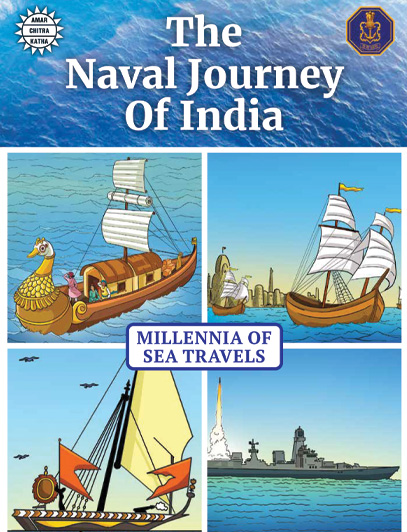
Comic of The Month
The Naval Journey of India Book I
This book is the first of a three-book series that takes a deep and detailed look at India's Naval History and a deep insight into the lives of our men and women in white. But any series on the Indian Navy has to start at the very beginning - exploring India's celebrated maritime history. Join our little hero, Bharat, and his grandfather, Commodore Sagar, as they sail into the deep blue waters of time. Book I of The Naval Journey of India takes a sweeping look at India's maritime endeavours, how the seas impacted us over millennia and how the oceans made us who we are.